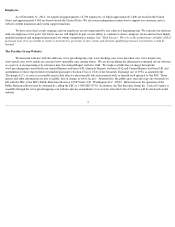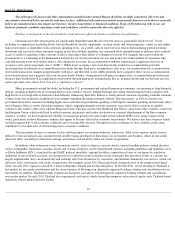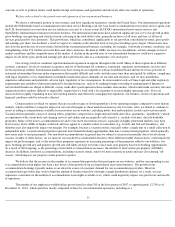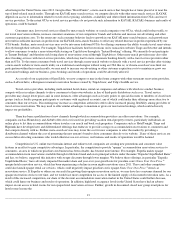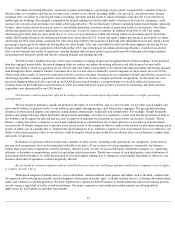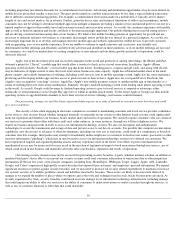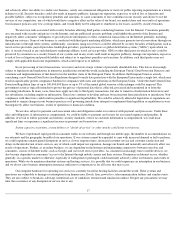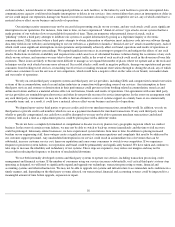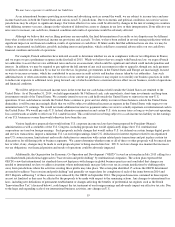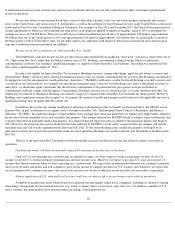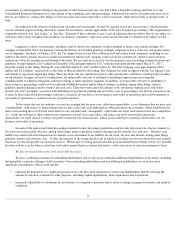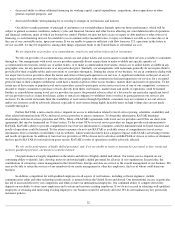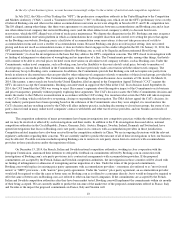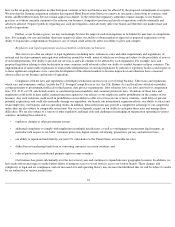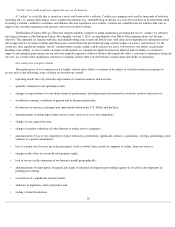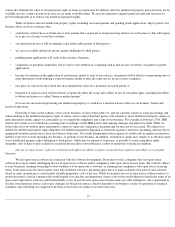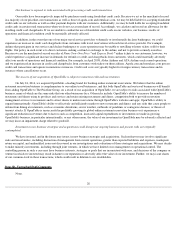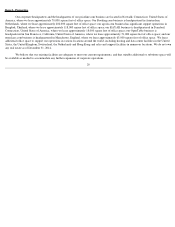Priceline 2014 Annual Report Download - page 23
Download and view the complete annual report
Please find page 23 of the 2014 Priceline annual report below. You can navigate through the pages in the report by either clicking on the pages listed below, or by using the keyword search tool below to find specific information within the annual report.
We may have exposure to additional tax liabilities.
As an international business providing reservation and advertising services around the world, we are subject to income taxes and non-
income based taxes in both the United States and various non-U.S. jurisdictions. Due to economic and political conditions, tax rates in various
jurisdictions may be subject to significant change. Our future effective tax rates could be affected by changes in the mix of earnings in countries
with differing statutory tax rates, changes in the valuation of deferred tax assets or changes in tax laws or their interpretation. If our effective tax
rates were to increase, our cash flows, financial condition and results of operations would be adversely affected.
Although we believe that our tax filing positions are reasonable, the final determination of tax audits or tax disputes may be different
from what is reflected in our historical income tax provisions and accruals. To date, we have been audited in several taxing jurisdictions with no
significant impact on our financial condition, results of operations or cash flows. If future audits find that additional taxes are due, we may be
subject to incremental tax liabilities, possibly including interest and penalties, which could have a material adverse effect on our cash flows,
financial condition and results of operations.
For example, French authorities have initiated an audit to determine whether we are in compliance with our tax obligations in France,
and we expect to get a preliminary response in the first half of 2015. While we believe that we comply with French tax law, we expect French
tax authorities to assert that we owe additional taxes and issue an assessment, which could be significant and which could include penalties and
interest. In addition, we may be required to pay upfront the full amount of any such assessment in order to appeal it, though any such payment
would not constitute an admission by us that we owe the tax. In general, governments in the United States and Europe are increasingly focused
on ways to increase revenues, which has contributed to an increase in audit activity and harsher stances taken by tax authorities. Any such
additional taxes or other assessments may be in excess of our current tax provisions or may require us to modify our business practices in order
to reduce our exposure to additional taxes going forward, any of which could have a material adverse effect on our business, results of operations
and financial condition.
We will be subject to increased income taxes in the event that our cash balances held outside the United States are remitted to the
United States. As of December 31, 2014 , we held approximately $6.9 billion of cash, cash equivalents, short-term investments and long-term
investments outside of the United States. We currently intend to use our cash held outside the United States to reinvest in our non-U.S.
operations. If our cash balances outside the United States continue to grow and our ability to reinvest those balances outside the United States
diminishes, it will become increasingly likely that we will be subject to additional income tax expense in the United States with respect to our
unremitted non-
U.S. earnings. We would not make additional income tax payments unless we were to actually repatriate our international cash to
the United States. We would pay only U.S. federal alternative minimum tax and certain U.S. state income taxes as long as we have net operating
loss carryforwards available to offset our U.S. taxable income. This could result in us being subject to a cash income tax liability on the earnings
of our U.S. businesses sooner than would otherwise have been the case.
Various legislative proposals that would reform U.S. corporate income tax laws have been proposed by President Obama's
administration as well as members of the U.S. Congress, including proposals that would significantly impact how U.S. multinational
corporations are taxed on foreign earnings. Such proposals include changes that would reduce U.S. tax deferral on certain foreign digital goods
and services transactions, impose a minimum U.S. tax on foreign earnings, limit U.S. deductions for interest expense related to un-repatriated
non-U.S.-source income, limit interest and royalty deductions in connection with certain related party transactions and put in place certain tax
disincentives for offshoring jobs or business segments. We cannot determine whether some or all of these or other proposals will be enacted into
law or what, if any, changes may be made to such proposals prior to being enacted into law. If U.S. tax laws change in a manner that increases
our tax obligations, our financial position and results of operations could be adversely impacted.
Additionally, the Organisation for Economic Co-
Operation and Development ("OECD") issued an action plan in July 2013 calling for a
coordinated multi-jurisdictional approach to "base erosion and profit shifting" by multinational companies. The action plan expressed the
OECD's view that international tax standards have not kept pace with changes in global business practices and concluded that changes are
needed to international tax laws to address situations where multinationals may pay little or no tax in certain jurisdictions by shifting profits
away from jurisdictions where the activities creating those profits may take place. The action plan identified 15 actions the OECD determined
are needed to address "base erosion and profit shifting" and generally set target dates for completion of each of the items between 2014 and
2015. Reports addressing 7 of these actions were released by the OECD in September 2014. The proposed measures contained in these reports
are not yet finalized as they may be affected by the proposals to be made with respect to the remaining actions. Any changes to international tax
laws, including new definitions of permanent establishment or changes affecting the benefits of preferential tax regimes such as the Dutch
"Innovation Box Tax" (discussed below), could impact the tax treatment of our foreign earnings and adversely impact our effective tax rate. Due
to the large and expanding scale of our international business activities, any changes in U.S.
19


